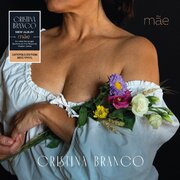
Songs
- artist:Cristina Branco
- release year:2023
- style(s):Fado, World
- country:Portugal
- formats:Audio File / Digital, CD (Compact Disc), LP / Vinyl
- record posted by:Locomotiva Azul
- label:Locomotiva Azul
- buy this record
Links
Cristina Branco called her new record “Mãe” (mother) and it couldn’t be any other way.
“Being a mother is like a path back home, it’s like starting a civilization over again. In this album, I wanted to face my own battle by focusing on what I was given to experience through music, how it welcomed me, how it overturned all the obstacles that prevented me from leaving my island. By having this mother as my companion for many years, I learned to be just me, making space to create songs, a fado outside of traditional fado and within it” she explains.
“Mãe” is music, her safe haven, the place where she has always snuggled – but on the album, which was released on September 22nd, Cristina Branco has Traditional Fado as her starting point. And of homage.
“Fado is almost magic, it is a process that you have to go through – to live, to learn, to respect. I have always looked at fado with immense respect but also with fear. A few years ago, I started singing more fado again, as a learning process, and I gained an immense passion for fado. Much more than I had at the beginning. Today, it’s really part of me and it was very important to make an album just about fado.”
It is fado, and Traditional Fado, which is spoken of as “Mãe”, from Fado Cravo to Fado Rosita, from Fado Santa Lúzia to Fado Carriche. “When you start, and you come with the freshness of youth, you think ‘I’m from fado, I’m going to do fado’ but, as time passed, I distanced myself from that language and began to realize that fado it was much more than what I was giving him. I needed to learn and respect, with humility, the genre in order to approach it”, concludes Cristina Branco.
“Mãe”, Cristina Branco’s 18th album in her 26-year career, moves in the solemnity that surrounds fado, in the magic that you find when you immerse yourself in the music but also in the emotion that the words translate, in the breaths of their commas , in the intensity of their silences.
The start, marked by the first single, “Senhora do Mar Redondo”, is a perfect example, a four-voice dialogue, where Lídia Jorge’s words are interpreted as if they were a mantle of liberation.
When choosing the poems for “Mãe”, Cristina Branco looked for the poetic density that fado has to carry, whether they were about unavoidable figures like Fernando Pessoa or David Mourão-Ferreira or the feminine cries of Aldina Duarte, Manuela de Freitas or Natália Correia. “I’m not a story to live, I’m a story to tell”, she intones in “Folha em Branco”: the words are from Teresinha Landeiro, who also wrote “Liberdade” and “Passos Certos”, but they define Cristina’s view in “Mãe”.
Through the contours of “Mãe”, we face melancholy head on but we also surrender to the nostalgia of our experiences. We rock our bodies in slow cadences but we also dance. If “Essa Tristeza” is passionate subtlety, “Noite Apressada” is shadow in search of expiation. “Liberdade” is a convinced ode but “Folha em Branco” is swagger. Throughout the album, Luís Figueiredo‘s piano is as subtle as it is emblematic, Bernardo Moreira‘s double bass both embraces and supports, Bernardo Couto‘s Portuguese guitar causes goosebumps with the same tranquility that marks each moment of passion – and then there is Cristina Branco’s voice, clear and pure, capable of perfectly translating every curve of life that has to be present when you really sing fado.
“Mãe” begins in silence and ends in silence, in the inordinate silence of Cristina Branco’s voice in “Fado de Uma Mulher Feliz Alone”. She is alone but, contrary to the title of Aldina Duarte’s poem, she is not alone. It is impossible to be alone when such a tradition is exposed. In “Essa Tristeza”, when she enacts the words of Manuela de Freitas, she assumes, between confession and pride, “I know that with this sadness I am neither free nor captive, I am a fado singer, for sure”. Let there be no doubt: Cristina Branco is a fado singer but, above all, in “Mãe”, Cristina Branco is from fado.


